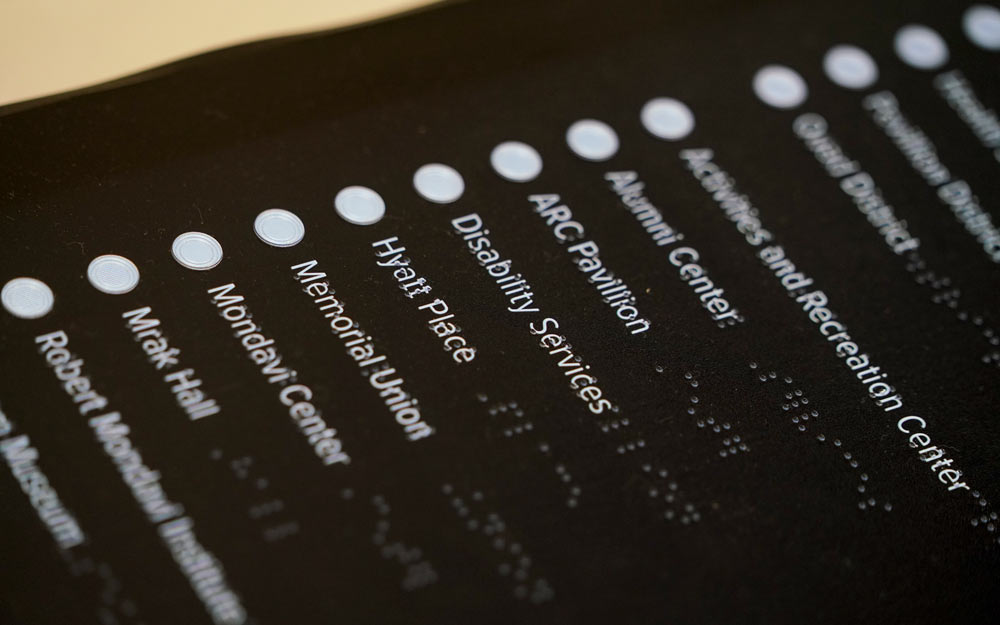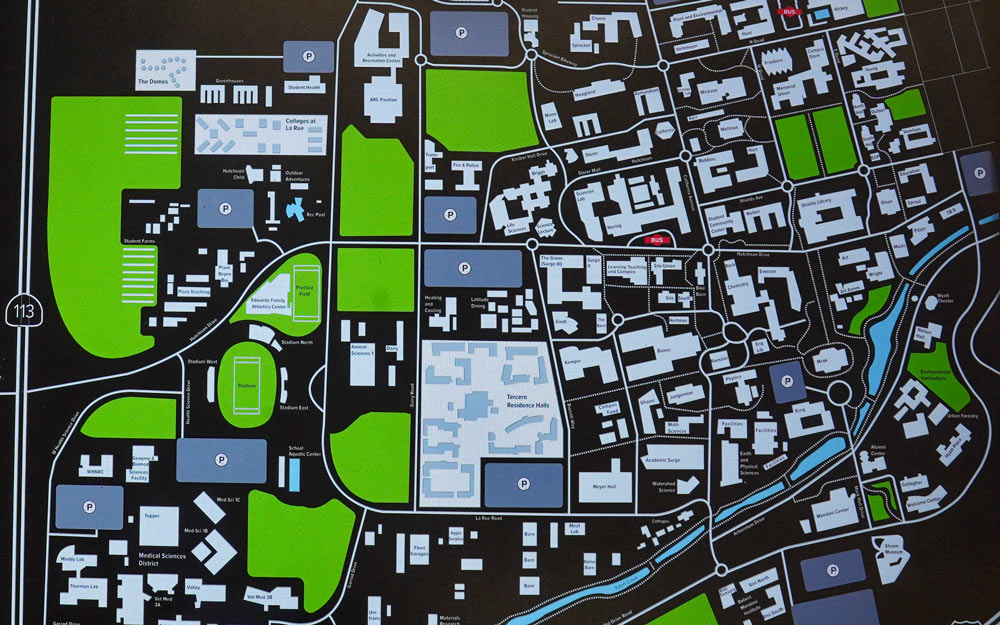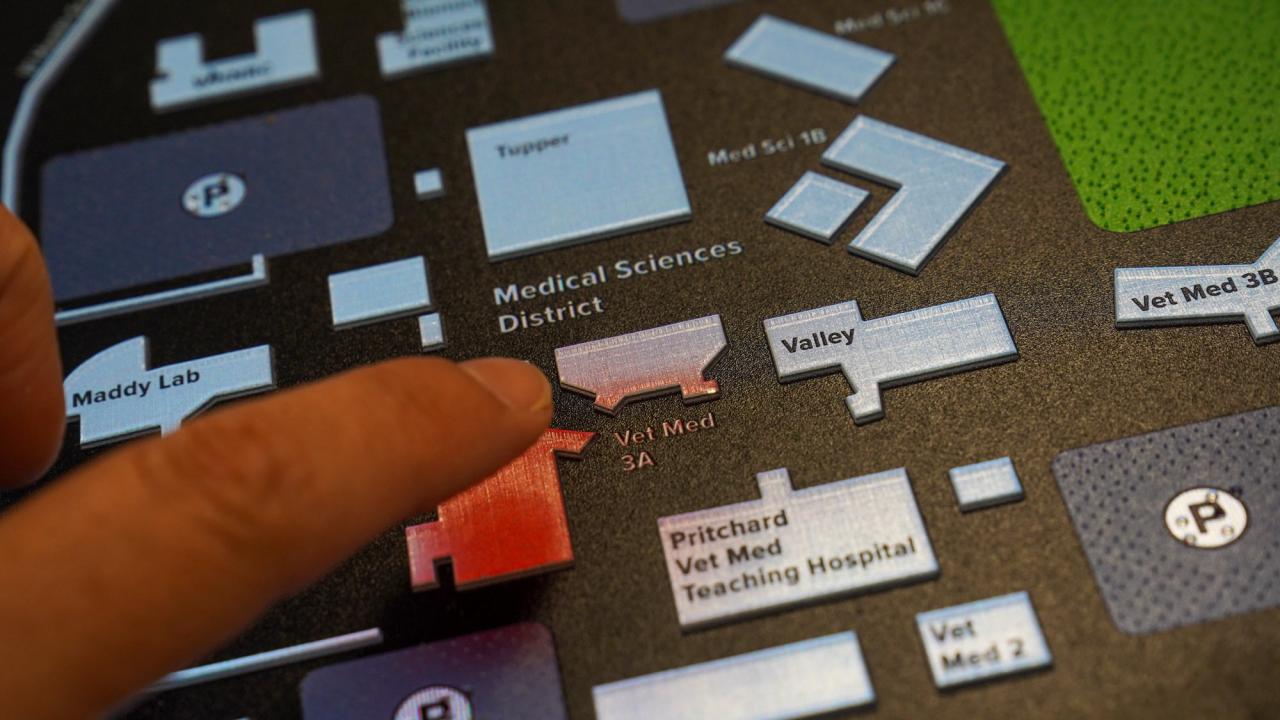Quick Summary
- Joshua Hori started project with a grant from Student Affairs
- Professor Susan Verba created a class to work on the design
- Try the map at Disability Awareness Symposium, Oct. 12
UC Davis has unveiled the prototype of a new navigational aid for visually impaired students and visitors: an interactive, tactile campus map, with audio.
You can try out the Tactile Audio Campus Map, or TAC Map, during the annual Disability Awareness Symposium, to be held Wednesday, Oct. 12, presented by the Disability Issues Administrative Advisory Committee and the Office of Diversity Equity and Inclusion. See more information in the box below.
The map was just a dream a few years ago, and this past summer it was delivered to the Student Disability Center, ready for campus viewing and use


The idea of creating an interactive map was born in 2018. Student Affairs offered grants for projects serving students, and Joshua Hori, then with the Student Disability Center, applied to build a prototype to replace the campus’s 25-plus-year-old Braille map. Today, Hori is working as accessible technology coordinator in Information and Educational Technology.
After the grant application was accepted, Hori enlisted help from Professor Susan Verba of the Department of Design. A course was created, and design students and visually disabled students enrolled to work on the prototype and test the tactile patterns.
Touch Graphics, a company that makes products that communicate spatial information through sense of touch, was enlisted to create the prototype, guided by the design proposed by the students. Recalling his visit to check out their work in progress, Hori said: “My jaw dropped when I saw their work; it was better than I thought possible, especially with regard to the audio interface.”
The final, three-dimensional printed map (featuring slightly raised buildings, roads, paths and more) sits atop a touchscreen video monitor. The map includes an index of major campus destinations with Braille captions. Upon touching a listing in the index, you can find it on the map by following a continuous sound that gets louder the closer you get to your destination. Or, you can simply touch anywhere on the map to hear the name of what you have touched (the map spells out "Mrak"). You can then trace a route to get there.
“The map is intended for low vision and blind students, but it really is for everyone because it shows what we can do as a community,” Hori said. “Hopefully it will expand everyone’s minds to what is possible.”
Sebastian Niles, accessible technology specialist at the Student Disability Center, agreed: “This map is just the beginning of innovation in navigating and wayfinding. We have more exciting projects in the works.”
If you have questions or are interested in viewing the map, contact the Student Disability Center by email. If you want to engage in the campus accessibility conversation, join the UC Davis Slack channel at #accessibilityhelp.
SYMPOSIUM: IN PERSON AND ZOOM
This year’s Diversity Awareness Symposium will be from 11 a.m. to 2 p.m. Wednesday, Oct. 12, in the multipurpose room of the Student Community Center and on Zoom, with refreshments provided for people who attend in person. Join a Zoom viewing party for the first two presentations (including one with an in-person component, the tactile map), then stay for the in-person presentation that will conclude the symposium. Or watch all three presentations on Zoom wherever you happen to be (you must register separately for each Zoom session you wish to attend):
- Campus Air Filtration —- Facilities Management will discuss its maintenance efforts around air filtration since COVID-19. 11 a.m.-noon, watch from anywhere on Zoom or attend the viewing party. Register for the Zoom session.
- Tactile Audio Campus Map, or TAC Map — Touch Graphics will discuss its collaboration with UC Davis to create this interactive, tactile map. Noon-1 p.m., watch from anywhere on Zoom or attend the viewing party, where the map will be demonstrated. Register for the Zoom session.
- Apple Accessibility — An Apple engineer will discuss the company’s new accessibility features for tbe iOS and Mac platforms. 1-2 p.m., in person, a continuation of the viewing party, or watch on Zoom.
Ahna Ligtenberg Heller is a communications analyst with Information and Educational Technology Client Success.
